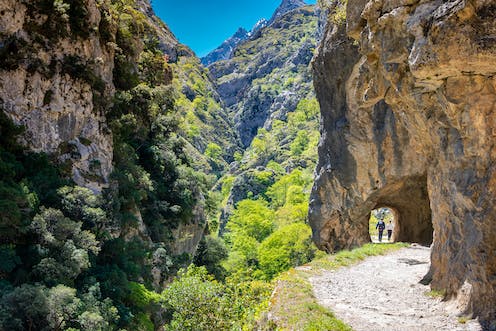Este medio se sostiene gracias a su comunidad. APOYA EL PERIODISMO INDEPENDIENTE .
El Cares hiking trail in Northern Spain. Shutterstock / SergioNF
“I’m going to the countryside over the weekend to disconnect.”
This is a common refrain among people who, overwhelmed by the big city, seek to spend a few days in nature as a means of escape. We all know it works – a couple of days spent in rural relaxation and we return with our batteries recharged.
The sheer concentration of people in urban areas is growing faster than desired. Currently, more than half of the world’s population lives in cities and the proportion is expected to continue to rise. It is estimated that, by 2050, seven out of ten people in the world will live in large municipalities. Many of us will spend up to 90% of our lives within buildings.
Life in the city has its advantages, but it also poses a significant mental health risk. In fact, mood disorders, anxiety and depression are up to 56% more common in urban settings than in rural ones.
Getaways to appease the amygdala
There is a mechanism in the brain that allows nature to change our perception of things. It’s called the amygdala.
This is suggested in a study from a few years ago. In situations of stress, the amygdala is activated more in city dwellers than people living in rural areas.
The amygdala is the region of the nervous system responsible for the control of emotions and feelings. This is logical because it is in a privileged position that allows it to establish connections with many different parts of the brain. One of these regions is the frontal lobe, which explains why the amygdala participates in the inhibition of behaviour and decision making.
The amygdala is also involved in other activities such as controlling our eating (it is responsible for the feeling of satiety), managing fear and stress, structuring memories, regulating sexual behaviour and controlling aggression.
The essence of fear is survival, and this portion of the brain helps us to survive by avoiding dangerous situations, because it continually reviews the information provided by our senses, instantly detecting what may affect our survival (whether that be real or not). Once the threat is identified, it develops a response that moves us away from risk, and our probability of survival increases.
The advantages of immersing oneself in a relaxing forest ‘bath’
We can intervene on the amygdala to help it avoid anxiety and stress.
It is possible to do it with medication – although science also offers us another cheaper and simpler option: just contact with nature.
A recent study has shown that repeated exposure to natural environments has a positive effect on amygdala activity. People in frequent contact with nature present less activity in their amygdala during stressful situations.
Interacting with the environment is, therefore, a way to improve mental health. The Japanese have a word for it: shinrin-yoku or “forest bathing”.
Many other studies have reached the same conclusion. They show that contact with nature increases our feeling of happiness and decreases mental anguish, since this contact reduces negative emotions and stress.
It also gives us greater capacity to manage daily tasks, improving the ability of the so-called “working memory”, which allows us to temporarily store information in the brain. To this we must add an improvement in cognitive function – attention, memory, orientation – both in adults and children, with benefits in terms of imagination, creativity and school performance.
Another advantage of going out into the countryside is that it is an activity that can be done alone. People who walk alone in nature are less prone to depression and stress.
Like any good treatment, contact with nature also requires the right dosage. We need to spend at least half an hour in nature per week to feel the mental health benefits.
In conclusion, exposure to nature decreases amygdala activity and has beneficial effects on stress-related brain regions. This suggests that walking in the countryside buffers the detrimental effects of city life. And, in turn, it potentially acts as a preventive measure against the development of some mental disorders.
The need for green oases
Leaving the city in search of trees and clean air is not always within everyone’s reach. In this sense, we have an enemy: the massive and uncontrolled growth of cities, especially when urban planning does not include large green areas. Even if such areas are included, it it is of little use if they are for decorative purposes – not taking into account the benefits these areas could have for the mood of the city’s inhabitants.
The impact of urban green spaces on mental health has been the subject of research for years. Many scientists point out the need to include natural elements in our city projects, taking into account the many benefits they bring to our psyche.
While we wait for our cities to become greener, there is no other choice but to take great care of our natural environment. It is for our own good: we do not want to anger the amygdala.
José A. Morales García no recibe salario, ni ejerce labores de consultoría, ni posee acciones, ni recibe financiación de ninguna compañía u organización que pueda obtener beneficio de este artículo, y ha declarado carecer de vínculos relevantes más allá del cargo académico citado.
Este periodismo no lo financian bancos ni partidos
Lo sostienen personas como tú. En un contexto de ruido, propaganda y desinformación, hacer periodismo crítico, independiente y sin miedo tiene un coste.
Si este artículo te ha servido, te ha informado o te ha hecho pensar, puedes ayudarnos a seguir publicando.
Cada aportación cuenta. Sin intermediarios. Sin líneas rojas impuestas. Solo periodismo sostenido por su comunidad.
Related posts
SÍGUENOS
Vídeo | Más de 9.000 detenidos sin juicio y la horca en el horizonte: Israel cruza otra línea roja
Mientras la Knéset acelera la pena de muerte para palestinos, Gaza arde con bombas de 3.500 °C suministradas por Estados Unidos
Sudán al borde del abismo: más de 1.000 días de guerra y el hambre como arma
La ONU advierte que lo peor está por llegar mientras el país con mayor nivel de hambre del mundo se desangra entre asedios, drones y abandono internacional.
Espiar al Congreso para proteger a Trump: el escándalo que asoma tras los papeles de Bondi sobre Epstein
La pregunta es devastadora: por qué el Departamento de Justicia monitoriza qué documentos consulta una representante electa en el ejercicio de su función de control.
Vídeo | Pascal Kaiser y el precio de existir en público
Cuando la visibilidad se castiga y el odio actúa con impunidad, la pregunta ya no es por qué cuesta mostrarse, sino quién protege a quienes lo hacen. El 30 de enero, en un estadio con 50.000 personas, un árbitro amateur alemán hizo algo tan cotidiano…
Vídeo | ¿En qué equipo estás?
Mismo deporte. Dos formas de estar en el mundo.


 Seguir
Seguir
 Seguir
Seguir
 Seguir
Seguir
 Subscribe
Subscribe
 Seguir
Seguir




